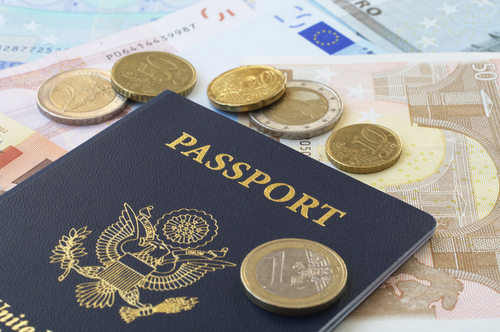Financial Considerations Before Traveling Abroad
Financial Considerations Before Traveling Abroad
The number one most important step to take is to notify your bank of your intended travel plans. Not doing so may result in the freezing of your debit card. Our clients’ security is a number one priority for us at F&M Bank, so if we see someone using your account outside of your normal activities, we are going to take precautions to protect you against fraud.
Traveling abroad can be full of excitement and fun, but it takes a decent amount of preparation. It is important to research hotel ratings, the best price in airfare, and tips for packing appropriate attire; but don’t forget to make sure you make financial preparations as well.

There are many financial considerations to take into account before embarking on your trip. You will need to consider security, foreign transaction fees, and exchange rates- and you will want a financial plan in place before take-off.
The number one most important step to take is to notify your bank of your intended travel plans. Not doing so may result in the freezing of your debit card. Our clients’ security is a number one priority for us at F&M Bank, so if we see someone using your account outside of your normal activities, we are going to take precautions to protect you against fraud. Simply call your bank branch and your Customer Service Representative will be glad to assist you by putting an alert of your travel plans on your account to avoid any complications.
At F&M Bank, we do not charge additional fees for using your debit card internationally. However, you will likely be charged foreign transaction fees (usually ranging from 1% to 5%) and ATM fees by the vendor you are using to withdraw funds. Additionally, many foreign ATMs only allow PIN transactions, so make sure you have your PIN number handy before traveling.
Here are some other suggestions to keep in mind:
• Travel with at least two forms of payment. If something goes wrong with one, you will want back up.
• Take photocopies of all of your important documents including your passport, credit cards, debit cards, birth certificate and driver’s license and store them in a different location than the documents themselves. This way, if something happens to the originals you will be able to prove your identity.
• Check your health insurance to make sure you will be covered while you are traveling. If not, consider purchasing a rider.
• The most expensive place to purchase currency is in the airport at your destination. Consider exchanging money through an international bank prior to departure.
If we can answer any questions to help you prepare for your next travel adventure, please contact us. We are always here to help as Your Community Bank. Bon voyage!



